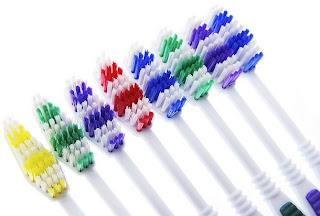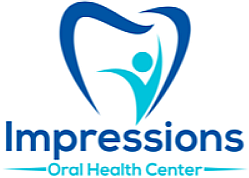Softly brushing your way to clean teeth, from Dr. Warren
October 12th, 2011

Just as there are so many different types of toothbrushes to choose from, each brush also has a different type of bristle! There are generally three different types of bristles; hard, medium, and soft. We always recommend that our patients, especially children and seniors, use a soft bristled toothbrush.
Using a hard and medium bristled brush can actually harm your teeth and gums by stripping the enamel from the teeth and irritating the gums so that they become red and sore, and can even cause gum recession. If you do use a hard or medium bristled brush as a personal preference, we recommend using an electric toothbrush.
Soft bristles are much gentler on your teeth and gums, and while patients of all ages are recommended to use soft bristled brushes, they are particularly great for children, seniors, patients recovering from a dental procedure, and patients wearing braces.
Soft bristles, and even extra-soft bristles are every bit as effective when it comes to cleaning your teeth; in fact, if you currently use a hard or medium bristled brush, try a soft bristled brush next time you buy a toothbrush and we bet you won’t even notice a difference!
Hope this helps!
- Dr. Warren and the team at Impressions Dental
Breaking bad habits with Dr. Warren
October 5th, 2011

At Impressions Dental, we know good dental health requires only a few minutes of your day. We thought we’d provide some practical advice on how to improve your or your child’s smile between your visits with Dr. Annette Warren.
Start by brushing your teeth twice a day. Proper brushing techniques are an essential part of maintaining good oral health, as well as preventing gum disease. Brushing daily helps remove decay-causing plaque from tooth surfaces. Please consult Dr. Warren if you would like us to review brushing techniques with you or your child. Flossing daily will also prevent plaque to build up between the teeth and prevent stains between your teeth. Research has shown the bacteria of gum disease has been linked to coronary artery disease, stroke, diabetes and memory loss. Lastly, we encourage you to throw away old toothbrushes and replace them every 2 or 3 months, or after an illness.
We hope this helps! If you have any further questions about any of these tips, please contact Impressions Dental or ask us on Facebook!
Manual vs. Electric Toothbrushes: What’s the Difference? From Dr. Warren
September 30th, 2011
Everybody is jumping on the electric toothbrush bandwagon in recent years, with many experts in the dental field claiming electric toothbrushes provide superior dental care. It’s true that electric toothbrushes are recommended for those who can’t do a good job brushing manually or who have arthritis or other conditions. But manual toothbrushes do have some advantages, according to an article we recently found including:
• Cost. While electric toothbrushes may be expensive for many people, manual toothbrushes are both inexpensive and accessible.
• Less pressure on your teeth & gums. While we can feel the amount of pressure we’re using as we grasp our manual toothbrush, we can’t feel the pressure nearly as well with an electric toothbrush. Placing too much pressure on our teeth can wear away at the tooth enamel, which causes pain, sensitivity, as well as an increased risk of tooth decay.
• Simple to pack. Manual toothbrushes are easy to carry around for those business or family trips. People are less likely to let their good dental care habits lapse on vacation with a toothbrush that they can easily bring along!
• Better for kids. Learning at a young age how to properly use a manual toothbrush helps children get a feel for how to properly take care of their oral hygiene.
Electric toothbrushes, on the other hand, are more effective in removing plaque and are considered a better alternative to maintaining gum health. Remember, whether you choose a manual or an electric toothbrush, Dr. Warren and our team at Impressions Dental encourage you to choose one with soft bristles and be sure to change the bristles on the electric brush when they become worn down. We also encourage you to replace your toothbrush every three months, when the bristles are no longer straight and firm or after you recover from a cold.
Give us a call if you have any questions or ask us on Facebook! Happy brushing!
Who’s afraid of the dentist? From Dr. Warren
September 19th, 2011

Does the sound of a drill make you flinch or cringe? Do you worry about your twice-yearly dental checkup? Trust Dr. Annette Warren and our team at Impressions Dental when we say you’re not alone! In fact, the Journal of the American Dental Association has estimated that 30 to 40 million people have a fear of visiting the dentist.
To eliminate some of that fear, we’ve put together six steps to help you or your child overcome your dental anxiety before visiting our Nassau office.
1. What are you most afraid of? Is it the sound of the drill? Do you have needle phobia? Have you been traumatized by previous dental visits? Write down your fears, one by one.
2. Don’t wait. The more frequently you visit our office, the less work needs to be done at any one visit. Simply having your teeth cleaned professionally by Dr. Warren twice a year prevents many, if not most, problems.
3. Bring a distraction to your appointment. Bringing along an iPod is a great idea. Just plug in those earphones, close your eyes, and get lost in the music. Listening to music can also be a pain killer.
4. Relax. Inhale slowly, and count of five. Hold your breath for 10 seconds, then exhale slowly to the count of eight. Repeat. Concentrate on making out every word of the lyrics. It's easier if you're not totally focused on the work going on inside your mouth.
5. Ask. Before any procedure, ask Dr. Warren or an assistant why we’re using the tools we’re using. Ask us what we're doing, what the tool is used for, and how it will benefit you during the appointment. Also, please ask about anti-anxiety medications that we may prescribe to help you relax during your appointment.
6. We are here to help you. Remember, we are health care professionals who want to improve your oral health, and will never judge you or the state of your mouth. Dr. Warren and team will do all we can to ensure a trauma-free and pain-free experience!
We hope this helps! For more on dental anxieties, ask us during your next visit to our convenient Nassau office! Or, ask us on Facebook!



